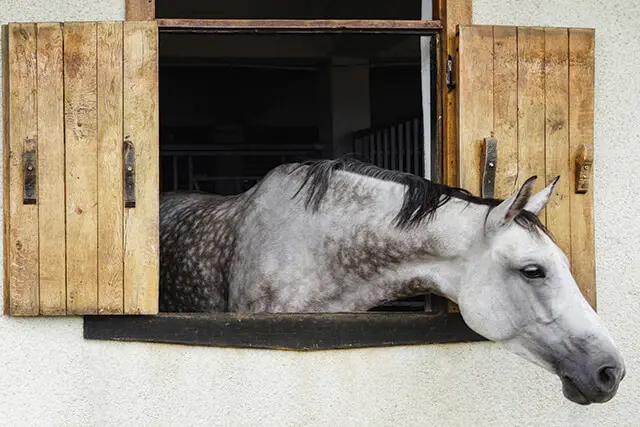Recurrent Airway Obstruction (RAO) - Heaves in Horses
Updated December 15, 2023 | By: Joan Maree Hinken, DVM, CVA, CVSMT

Understanding Heaves in Horses
Recurrent Airway Obstruction (RAO), also known as Heaves is a common, performance-limiting, allergic respiratory disease in horses.
Episodes of airway obstruction occur when susceptible horses are exposed to common allergens. The respiratory disease involves inflammation of small airways with the production of mucus and bronchoconstriction.
In the past, heaves was also known as COPD or Chronic Obstructive Pulmonary Disease, but experts now recognize that this respiratory condition in humans is not the same as the one in horses. RAO is more similar to asthma in people, so veterinary specialists introduced the term Equine Asthma Syndrome. Both RAO and the related IAD or Inflammatory Airway Disease are included under this term.
Differences Between Recurrent Airway Obstruction and Inflammatory Airway Disease
Inflammatory Airway Disease (IAD) is a group of inflammatory conditions of the lower respiratory tract that appear to be primarily non-infectious. It occurs in 22-50% of athletic horses and is specifically common in young racehorses on the track. Possible causes of IAD include:
- Allergic airway disease
- Recurrent pulmonary stress
- Deep inhalation of dust
- Atmospheric pollutants
- Persistent respiratory viral infections
While both conditions have similar etiologies, RAO is a more chronic condition and may occur as a result of chronic IAD. Heaves typically occurs in horses nine years of age and older, while IAD is usually seen in younger horses. Further, horses with IAD often appear normal at rest, but horses suffering from heaves exhibit symptoms of increased respiratory effort and coughing at rest.
Causes of Heaves in Horses

Heaves is a respiratory disease that occurs in response to the horse’s sensitivity to allergens they inhale. Approximately 12% of adult horses have some degree of allergen-induced lower airway inflammation. There is no breed or gender predilection to developing heaves, but there does appear to be a genetic component to susceptibility.
Most horses exhibit clinical signs of heaves when exposed to common allergens found in hay, bedding (especially straw), and their environment.
The lower airway includes the structures below the larynx - the trachea, bronchi, bronchioles, and alveoli. The horse’s body responds to lower airway inflammation by producing mucus in the bronchioles and bronchi. The walls of these respiratory structures will thicken, causing them to narrow, and with the mucus production, it takes increased effort for the horse to breathe.
Two Types of Heaves in Horses
There are two different forms of RAO in horses.
- Barn type - associated with stabled horses. Winter and spring appear to be the most common seasons for the appearance of the barn-associated RAO as barns typically have less ventilation in colder months.
- Pasture type - often called summer heaves. These horses are responding to the fungal spores that can occur in the grasses during the summer and fall months, most commonly in the southeast US.
Clinical Signs and Symptoms of Heaves in Horses

The signs and symptoms of barn and summer pasture associated RAO in horses include:
- Frequent coughing (can be dry or productive)
- Exercise intolerance or poor performance
- Labored breathing at rest (can make a horse anxious and sweaty)
- Flared nostrils and elevated respiratory rate at rest
- Excessive mucus in the airways leading to nasal discharge
- Depression and/or inappetence
- Increased movement of abdominal muscles during breathing (causing the “heave line”)
Diagnosis of Heaves in Horses
An initial diagnosis of RAO can usually be made based on the horse’s medical history and a physical examination. However, additional tests to rule out other conditions with similar signs or to monitor the horse’s response to treatment may be needed. These include:
- Bloodwork
- Endoscopy
- Bronchoalveolar lavage (BAL, obtaining cells directly from the lower airway)
- Chest x-rays
- Lung function tests and/or lung biopsy
- Ultrasonography
Having a baseline, or beginning value, can help in determining if the horse is responding to treatment.
Treatment and Management of Heaves in Horses
While there is no cure for RAO, the most important treatment is environmental and dietary management to reduce exposure to organic dust and mold. It is possible to successfully manage and prevent heaves episodes using a four-pronged management approach:
- Prescription medications
- Supplements
- Diet
- Environment
Prescription Medications for Treating Heaves
Once you’ve called your veterinarian, they can treat heaves with medications to relieve your horse right away, and then provide medical support long-term. Systemic corticosteroids and aerosolized bronchodilators are the most immediate and helpful medications for a horse in respiratory distress.
Injectable Medications for RAO
Dexamethasone, administered intravenously, can improve lung function within two hours. The dose can be tapered off over the course of one to several weeks. In milder cases, prednisolone is considered a less potent option with fewer possible side effects. However, oral prednisone tablets are not recommended for the treatment of RAO as they have poor bioavailability in the horse.
Oral and Inhaled Medications for RAO
For immediate relief of acute, severe airway obstruction, rapid-acting bronchodilators (inhalers for horses) are a great tool. These can be administered via a nebulizer (equine aerosol chamber), which is a headstall that covers the horse’s entire muzzle, or with a bell-shaped inhaler used to cover one nostril at a time.
Aerosolized albuterol works by relaxing the muscles of the airway, which can improve lung function and breathing by 70% within 5 minutes post-administration. However, its positive effects only last 1-3 hours. The oral bronchodilator clenbuterol provides long-acting bronchodilation for moderate to severe cases of RAO. Since bronchodilators have no anti-inflammatory properties, they should not be used alone in treating heaves.
Aerosolized corticosteroids have been shown to be effective in treating horses with mild to moderate heaves. These can be used in conjunction with systemic therapy in severe cases. The benefit of using aerosolized corticosteroids is that they have reduced side effects compared to systemic corticosteroids (such as laminitis).
Supplements That May Support Respiratory Health
The American College of Veterinary Internal Medicine published a consensus statement on inflammatory airway disease in horses that mentions the benefit of combining omega 3 fatty acids with other management changes. The group of horses that was supplemented with omega 3s (DHA in particular) in addition to management changes demonstrated positive results sooner than the group that underwent management changes alone.
Some other supplements that may lend respiratory support include:
- Antioxidants are recommended as RAO may place horses under additional oxidative stress on the airway.
- Vitamin C specifically is being investigated for its role in neutralizing the excessive free radicals associated with heaves.
- MSM has a long track record of safe use in the horse and has also been shown to be a potent antioxidant. Some veterinarians routinely recommend the use of MSM in seasonal allergic conditions of the respiratory tract.
- Other choices are plant adaptogens, which restore the body’s natural equilibrium, and botanical preparations which combine the extracts of several medicinal herbs.
Diet
Steaming or soaking hay in water—or feeding bagged chopped hay, hay cubes, or pelleted feed—is often recommended to reduce the dusts and molds in hay that can trigger an episode of heaves. Completely replacing hay with another good quality fiber source, such as a complete feed, is an additional option.
Environment

Ideally, horses with heaves should be turned out as much as possible. For horses with heaves that live inside, good ventilation is vital. This is especially important in the winter when many barn doors and windows are closed most of the time.
Dry hay and dusty bedding are the cause of most of the small particles that get into a horse’s airway. Both are directly in the horse’s “breathing zone,” which is the two-foot sphere around your horse’s nose from where he draws his breath. Dry hay and dusty bedding also contain high levels of reactive dust and allergens.
If the horse must be stalled, dust-free bedding should be used, such as specially treated wood shavings, shredded paper or cardboard, peat moss, corn cobs, or other materials. Straw is a particularly poor type of bedding for horses with heaves. Keep in mind that your horse’s stablemate eating hay nearby or in its own dusty bedded stall can trigger episodes of heaves in your own horse.
Help make your horse more comfortable by feeding them grain in a container on the ground so airway mucus can drain. Try not to sweep or blow the barn aisle when the horse is inside.
Additionally, keep watch of the air quality index to make sure it's safe for your horse to work.
Prognosis for Horses with Heaves
Although each horse’s signs and severity of RAO can vary, the vast majority of horses with heaves can be successfully managed for much, if not all their lives. Many horses with heaves can still be happy trail or pleasure horses, or even maintain a competitive performance career with a dedicated owner who understands that RAO is a chronic condition, requiring lifelong management.
Questions to Ask Your Veterinarian
- Can I continue to ride and show my horse if he has heaves?
- How long will my horse have to be on steroids and bronchodilators?
- Will this condition continue to worsen?
Additional Horse Owner Resources
- Curious about why your horse is coughing during your warm-up? Watch this video on horses coughing and sneezing to learn more.